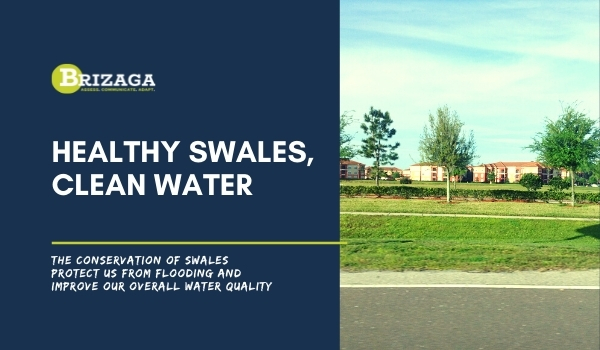
If you live in Florida, you have probably seen or heard of swales, but have you ever asked yourself what purpose they serve?
It is important to get acquainted with these grassy slopped strips of land you see between streets and sidewalks, and sometimes besides or in front of homes. Aside from beautifying our neighborhoods, swales protect us from flooding and improve our overall water quality – it is now our turn to protect them!
Swales are a versatile nature-based stormwater management tool that assist in reducing the severity of flooding and help to maintain clean water through its natural filtration system. They are designed to divert stormwater by gravity, slowing down the flow of water and allowing excess water to pond temporarily. The soil then holds and cleans the stormwater from the pollutants it picks up along the way, as it percolates into the ground. In doing so, it minimizes roadside flooding and protects our environment by reducing stormwater runoff pollution from entering the Biscayne Bay, canals, and underground drinking water supplies. Unfortunately, when we park on swales, the weight of the cars compacts the soil which makes it more difficult for water to soak in.
Although swales are typically owned by the County and are considered public property, by law, property owners are responsible for maintaining the swale in front of their property. Many homeowners don’t know where to start when it comes to maintaining their swale. Here you may find some quick tips and tricks to help you keep your swale functioning properly, so you may reap the benefits they naturally provide.
- Keep the grass under control, mow it when necessary.
- Reduce your fertilizer, pesticides, and herbicides usage to prevent nutrient runoff entering the canals and importantly our Biscayne Bay.
- Every few months or so, gently poke holes into the swale to aerate the soil (use a land aerator) to keep a healthy flow of water.
- Keep swales free of trash, debris, grass clippings, and leaves.
- If you notice illegal dumping or bulky waste, call for pick-up to remove these materials (you can also call your municipality to report any illegal dumping).
- Be a role model, encourage visitors and neighbors not to park on swales and explain to them why.
- If your swale is flooded for more than 72 hours, call your municipality.
- Avoid paving swales.
